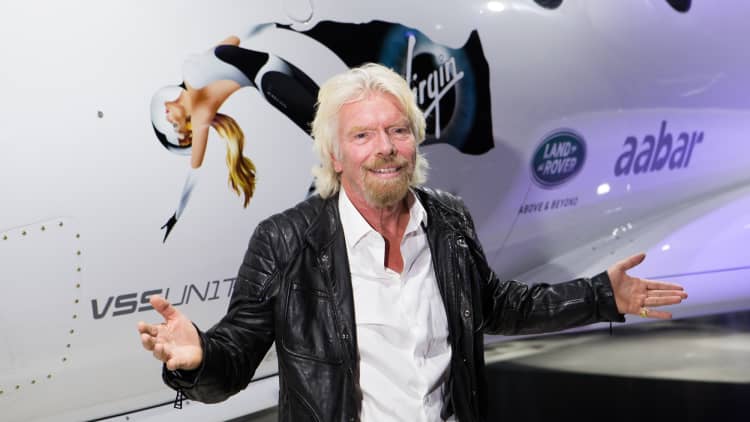Jamie Siminoff, the CEO and founder of Ring, was rejected by a roomful of celebrity investors during his 2013 appearance on "Shark Tank." All of the sharks except Kevin O'Leary passed, and he made what Siminoff considered an unacceptable offer. He left without a deal.
"I remember after that 'Shark Tank' episode literally being in tears," he tells CNBC Make It. "I needed the money, we were out of money at the time."
But the airing of the episode created enough publicity to drive a flood of sales for Siminoff's company, then called Doorbot, which sold WiFi enabled doorbells. Siminoff, who started the business in his garage, re-branded the company as Ring in 2014 and added new home security products in addition to the doorbells, which let users see and talk to visitors through their smart phones.
Since then, Ring has seen immense growth.
"It has now been four years since 'Shark Tank,' and the business is now valued at $1 billion," Siminoff, 41, says on an update for the show that aired Nov. 12, 2017. "Today we're over 1,300 people, 10 core products, [sold in] 16,000 stores."
While the "Shark Tank" investors missed out, there is one celebrity entrepreneur who didn't: Richard Branson.
Ring's video doorbells caught Branson's eye in spring of 2015 through a guest visiting Necker Island, Branson's resort in the British Virgin Islands.
The guest encountered a common problem on his trip: He wasn't around to answer the door for a delivery to his home back in San Francisco. He used Ring's video doorbell and his smartphone to check in with the delivery person as they were dropping off the package.
"[The guest] showed it to Richard, and Richard thought it was wonderful," Siminoff explains. So the customer reached out to Siminoff to tell him about Branson's interest.
"This guy emailed me and Richard and said, 'Hey Jamie, Richard wants to use [the Ring doorbell] as a holiday gift," Siminoff recalls. "I'm thinking, like 'Oh great. I'm introduced to some guy named Richard who wants to buy like 20 of them for the holidays.'"
Then, he caught the last name on the email address. "I'm like, 'Wait a second,'" Siminoff says. "That was Richard Branson."
This wasn't his first encounter with the billionaire. Siminoff — who has been a serial entrepreneur since graduating college — missed a chance to connect with Branson in 2001 when the pair shared an elevator in a hotel, according to Fortune.
"James and I first met by chance in a lift in Brussels many years ago (he didn't do the elevator pitch!)," Branson writes on his blog.
This time, Siminoff took full advantage of the opportunity.
"[Branson] emailed me saying, 'I'd love to give this to my friends for Christmas,'" Siminoff remembers. "We started going back and forth. I slipped in there — I, a little bit of knew what I was doing — but I said, 'That's great because now all your friends will have safer homes and safer neighborhoods.'"
Siminoff explained a bit more about his idea for disrupting the home security industry and peaked Branson's interest.
"Now he's obviously getting interested and realizing this is not just a toy, and he said, 'Well, maybe I could invest,'" Siminoff says. Great news, but the timing was tricky — Ring was already in the midst of raising its Series B.
Siminoff replied to Branson, "If you want to invest, you have to do something like right now.
"He sent over his investment guy literally the next day," says Siminoff.
Branson participated in that $28 million round of funding in 2015, which gave the company a $60 million valuation, according to Ring's blog. Ring's latest round of funding in January 2017 (in which Branson also participated) brought the company's total funding to $209 million, according to The Wall Street Journal. After the round, the Los Angeles Times reported Ring's valuation at $460 million.
Branson — a guest investor on "Shark Tank," who Siminoff says owns 5 percent of the business — belives the sharks' loss was his gain.
"I couldn't quite work out why the sharks turned him down, it just seemed to be a wonderful idea," Branson says on the "Shark Tank" update.
"Sorry, Mark [Cuban]," Branson teases.
On his blog, Branson explains that he invested in the company because of its focus on making communities safer.
"I love building companies that have real purpose behind their mission, and this goes for my investments too," Branson writes. "Ring's mission is to reduce crime in neighborhoods. It is a simple, clear, powerful purpose and one that can have a global impact. It is just the type of business I like to invest in, run by a passionate founder who wants to make peoples' lives better and safer through technology."
And for Siminoff, Branson is bringing his big-idea style of leadership to the company.
"He's very hands off from the day-to-day type stuff," Siminoff says. Instead, Branson is much more likely to ask, "What are we doing in five years? 10 years? What is the real big thing that we're going to do next?"
According to Siminoff, "That is the stuff that excites him."
Don't miss: Billionaire Richard Branson: This skill set is the most critical to achieving success
Like this story? Like CNBC Make It on Facebook.
Disclaimer: CNBC owns the exclusive off-network cable rights to "Shark Tank."



